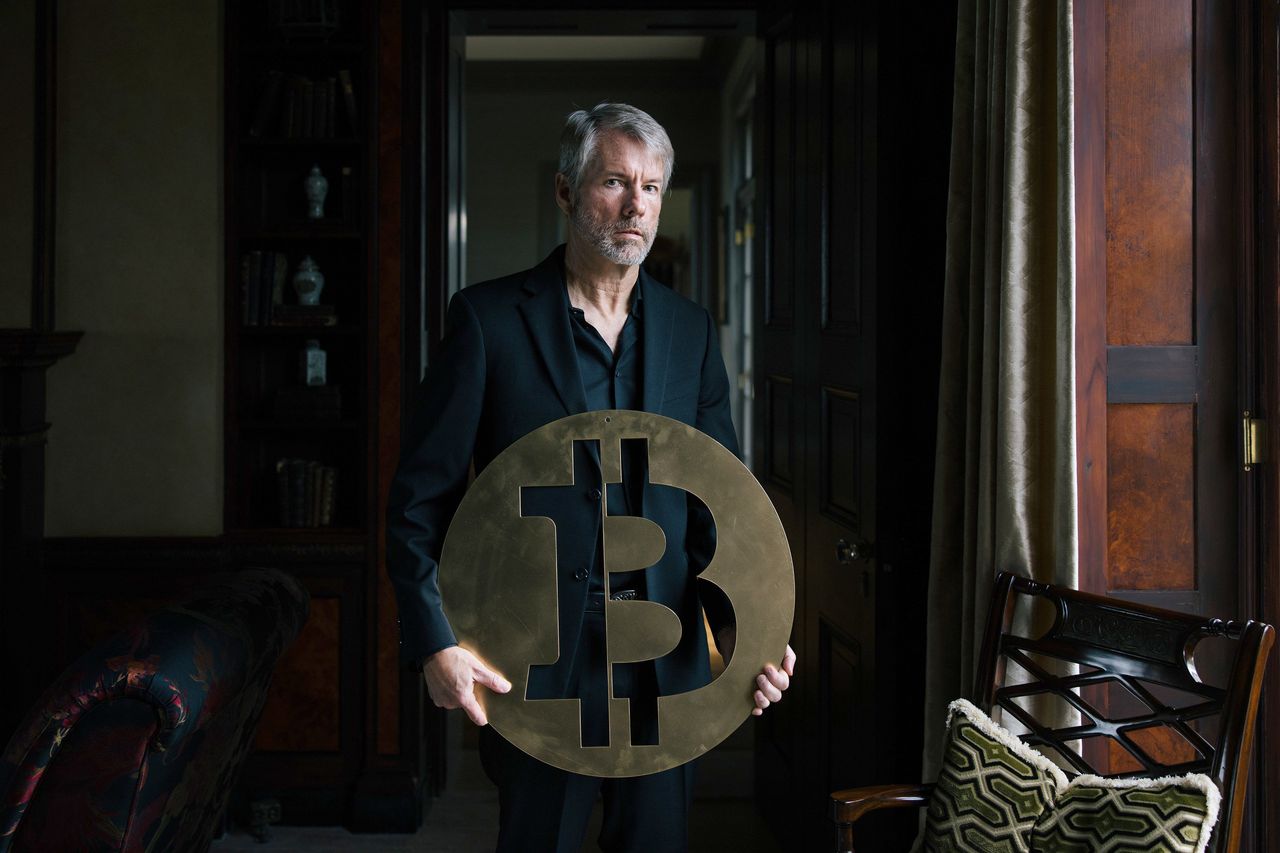Michael Saylor Bet Billions on Bitcoin and Lost
The longtime MicroStrategy CEO, and perhaps the biggest bitcoin bull, steps down.
If you ask Michael Saylor why he bet the future of his company on bitcoin, he’ll tell you he didn’t have a choice.
In 2020, MicroStrategy Inc.’s stock was stagnant, and the tech company struggled to compete with software giants. “We were either going to die a fast death, or a slow death, or embark on a risky strategy,” he said.
He opted to buy bitcoin—lots of it. That decision backfired, badly. On Tuesday, MicroStrategy announced Mr. Saylor would step down as CEO, a position he has held since 1989, amid mounting losses tied to bitcoin.
His dalliance with bitcoin began on Aug. 11, 2020 when the company announced a plan to take $500 million—half of its corporate reserve—and convert it into bitcoin. It has since doubled down, and doubled down again.
In total, MicroStrategy raised $3.45 billion in debt and loans. It issued $1.44 billion in equity. The company used it all to buy bitcoin.
For a time, the decision appeared to be working. The price of bitcoin rose from about $17,088 in August 2020 to nearly $99,000 by November 2021. MicroStrategy’s stock rose from US$124 the day before its announcement to a record of US$1,273 on Feb. 9, 2021.
But on Tuesday, MicroStrategy announced its seventh quarterly loss in the eight quarters since it started buying bitcoin. This time the loss was big: $1.44 billion, much of that from bitcoin.
The same day, the company announced Phong Le, the company’s president, will take on the additional role of CEO. Mr. Saylor took on the role of executive chairman.
MicroStrategy shares were down 49% year-to-date through Tuesday, and 78% from its record.
The company is sitting on nearly 130,000 bitcoins valued at roughly $4.3 billion at current market prices. Its market capitalisation is about $4.45 billion. Essentially, MicroStrategy has become a bitcoin-holding vehicle with a cash-generating software business attached to it.
MicroStrategy’s losses reflect the volatility of bitcoin. Under accounting rules, the company must assess the value of its bitcoin holdings each quarter and take an impairment charge if the price has declined. MicroStrategy has taken a string of such charges totalling about $3.5 billion.
The bitcoin strategy turned Mr. Saylor into one of bitcoin’s most visible proponents. His Twitter feed, followed by 2.6 million, is a constant stream of pro-bitcoin quips.
He is uniformly bullish in interviews. In one, he advised people to “take all your money and buy bitcoin. Then take all your time, figure out how to borrow more money to buy more bitcoin. Then take all your time to figure out what you can sell to buy bitcoin.”
He similarly advised a conference room full of crypto enthusiasts in Miami to never sell their bitcoin.
It is this very philosophy that has worried some market observers.
“MicroStrategy is not an ideal investment for most traders,” said Oanda analyst Edward Moya.
For one thing, Mr. Moya said, MicroStrategy’s strategy was only to buy and hold bitcoin. There was no profit-taking. There also was no hedging against the inevitable volatility and tumbles. When the selloffs came, MicroStrategy was exposed to the full breadth of them.
Another problem is that the company doesn’t have many more ways to get more money to buy more bitcoin, said BTIG analyst Mark Palmer. “A lot of the levers MicroStrategy could have pulled to create more capacity have been pulled,” he said. “Now it’s just using the cash flow from the software business.”
Still, Mr. Palmer said, the ultimate judgment on MicroStrategy’s bitcoin bet won’t come until some of that debt it borrowed to buy bitcoin starts to mature. If the price of bitcoin languishes, the company is going to have problems paying back its creditors, he said.
“The ticking clock is the maturity of the MicroStrategy debt,” he said.
Despite the risks and the criticisms, Mr. Saylor still believes in his strategy, and bitcoin. In an interview last week, he noted that the stock is still well above its pre-bitcoin levels, and believes the strategy has raised the company’s profile, despite the risks attached to it.
“I feel better about it today than I did on the day we started,” he said.
He says he will continue to head MicroStrategy’s bitcoin investments. He has no plans to sell any bitcoin, and still expects it to gain in value over the years. The company reiterated Tuesday it has no plans to sell any bitcoin.
Mr. Saylor said swapping the CEO roles had been a long-term plan. “The new executive structure means I can even more enthusiastically focus on communications and strategy and bitcoin advocacy and evangelism,” he said.
 Copyright 2020, Dow Jones & Company, Inc. All Rights Reserved Worldwide. LEARN MORE
Copyright 2020, Dow Jones & Company, Inc. All Rights Reserved Worldwide. LEARN MORE
This stylish family home combines a classic palette and finishes with a flexible floorplan
Just 55 minutes from Sydney, make this your creative getaway located in the majestic Hawkesbury region.
Continued stagflation and cost of living pressures are causing couples to think twice about starting a family, new data has revealed, with long term impacts expected
Australia is in the midst of a ‘baby recession’ with preliminary estimates showing the number of births in 2023 fell by more than four percent to the lowest level since 2006, according to KPMG. The consultancy firm says this reflects the impact of cost-of-living pressures on the feasibility of younger Australians starting a family.
KPMG estimates that 289,100 babies were born in 2023. This compares to 300,684 babies in 2022 and 309,996 in 2021, according to the Australian Bureau of Statistics (ABS). KPMG urban economist Terry Rawnsley said weak economic growth often leads to a reduced number of births. In 2023, ABS data shows gross domestic product (GDP) fell to 1.5 percent. Despite the population growing by 2.5 percent in 2023, GDP on a per capita basis went into negative territory, down one percent over the 12 months.
“Birth rates provide insight into long-term population growth as well as the current confidence of Australian families,” said Mr Rawnsley. “We haven’t seen such a sharp drop in births in Australia since the period of economic stagflation in the 1970s, which coincided with the initial widespread adoption of the contraceptive pill.”
Mr Rawnsley said many Australian couples delayed starting a family while the pandemic played out in 2020. The number of births fell from 305,832 in 2019 to 294,369 in 2020. Then in 2021, strong employment and vast amounts of stimulus money, along with high household savings due to lockdowns, gave couples better financial means to have a baby. This led to a rebound in births.
However, the re-opening of the global economy in 2022 led to soaring inflation. By the start of 2023, the Australian consumer price index (CPI) had risen to its highest level since 1990 at 7.8 percent per annum. By that stage, the Reserve Bank had already commenced an aggressive rate-hiking strategy to fight inflation and had raised the cash rate every month between May and December 2022.
Five more rate hikes during 2023 put further pressure on couples with mortgages and put the brakes on family formation. “This combination of the pandemic and rapid economic changes explains the spike and subsequent sharp decline in birth rates we have observed over the past four years,” Mr Rawnsley said.
The impact of high costs of living on couples’ decision to have a baby is highlighted in births data for the capital cities. KPMG estimates there were 60,860 births in Sydney in 2023, down 8.6 percent from 2019. There were 56,270 births in Melbourne, down 7.3 percent. In Perth, there were 25,020 births, down 6 percent, while in Brisbane there were 30,250 births, down 4.3 percent. Canberra was the only capital city where there was no fall in the number of births in 2023 compared to 2019.
“CPI growth in Canberra has been slightly subdued compared to that in other major cities, and the economic outlook has remained strong,” Mr Rawnsley said. “This means families have not been hurting as much as those in other capital cities, and in turn, we’ve seen a stabilisation of births in the ACT.”
This stylish family home combines a classic palette and finishes with a flexible floorplan
Just 55 minutes from Sydney, make this your creative getaway located in the majestic Hawkesbury region.






















